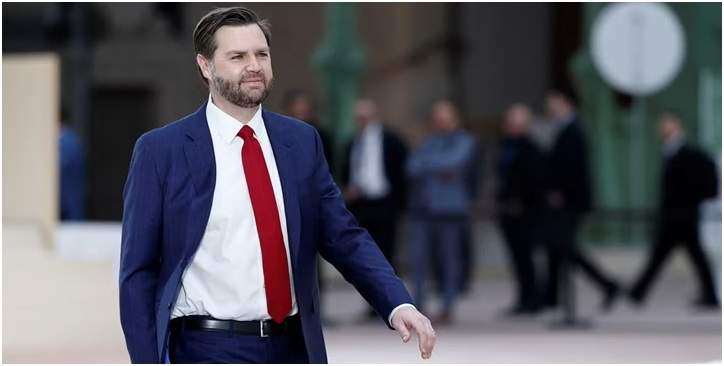JD Vance Rails Against ‘Excessive Regulation’ Of AI At Paris Summit
15 Feb 2025 17:13:56

Paris: U.S. Vice President JD Vance
warned global leaders and tech CEOs at a Paris summit on artificial
intelligence on Tuesday that “excessive regulation” would kill the rapidly
growing AI industry.
In his first foreign trip as vice
president, Vance also said the Trump administration will “ensure that AI systems
developed in America are free from ideological bias,” and that the United
States would “never restrict our citizens’ right to free speech.”
“Now, at this moment, we face the
extraordinary prospect of a new industrial revolution, one on par with the invention
of the steam engine,’’ Vance said. ‘’But it will never come to pass.
If
overregulation deters innovators from taking the risks necessary to advance the
ball.’’
Vance’s address challenged Europe’s
regulatory approach to artificial intelligence and its moderation of content on
Big Tech platforms, underscoring divergence between the United States and its
allies on AI governance. The summit has drawn world leaders, top tech
executives, and policymakers to debate AI’s impact on security, economics, and
governance.
A three-way race for AI dominance
The differences were openly
displayed at the summit: Europe seeks to regulate and invest, China expands
access through state-backed tech giants, and the U.S., under President Donald
Trump, champions a hands-off approach.
Among the high-profile attendees is
Chinese Vice Premier Zhang Guoqing, reflecting Beijing’s interest in shaping
global AI standards.
Vance has been an outspoken critic
of European content moderation policies. He has suggested the U.S. should
reconsider its NATO commitments if European governments impose restrictions on
Elon Musk’s social media platform, X. His Paris visit is also expected to
include candid discussions on Ukraine, AI’s role in global power shifts, and
U.S.-China tensions.
How to regulate AI?
Concerns over AI’s potential dangers
have loomed over the summit, particularly as nations grapple with how to
regulate a technology that is increasingly entwined with defense and warfare.
“I think one day we will have to
find ways to control AI or else we will lose control of everything,” said
Admiral Pierre Vandier, NATO’s commander who oversees the alliance’s
modernization efforts.
Beyond diplomatic tensions, a global
public-private partnership is being launched called “Current AI,” aimed at
supporting large-scale AI initiatives for the public good.
Analysts see this as an opportunity
to counterbalance the dominance of private companies in AI development.
However, it remains unclear whether the U.S. will support such efforts.
Separately, a high-stakes battle
over AI power is escalating in the private sector.
A group of investors led by Musk —
who now heads Trump’s Department of Government Efficiency — has made a $97.4
billion bid to acquire the nonprofit behind OpenAI. OpenAI CEO Sam Altman,
attending the Paris summit, swiftly rejected the offer on X.
The US-China rivalry
In Beijing, officials on Monday
condemned Western efforts to restrict access to AI tools, while Chinese company
DeepSeek’s new AI chatbot has prompted calls in the U.S. Congress to limit its
use over security concerns. China promotes open-source AI, arguing that
accessibility will ensure global AI benefits.French organizers hope the summit
will boost investment in Europe’s AI sector, positioning the region as a
credible contender in an industry shaped by U.S.-China competition.
French President Emmanuel Macron,
addressing the energy demands of AI, contrasted France’s nuclear-powered
approach with the U.S.’s reliance on fossil fuels, quipping: France won’t
“drill, baby, drill,” but “plug, baby, plug.”
Vance’s diplomatic tour will
continue in Germany, where he will attend the Munich Security Conference and
press European allies to increase commitments to NATO and Ukraine. He may also
meet with Ukrainian President Volodymyr Zelenskyy.
Talking Ukraine and Middle East with
Macron
Vance will discuss Ukraine and the
Middle East over a working lunch with Macron.
Like Trump, he has questioned U.S.
aid to Kyiv and the broader Western strategy toward Russia. Trump has pledged
to end the war in Ukraine within six months of taking office.
Vance is also set to meet separately
with Indian Prime Minister Narendra Modi and European Commission President
Ursula von der Leyen.